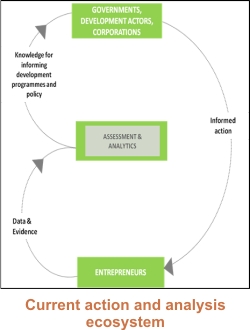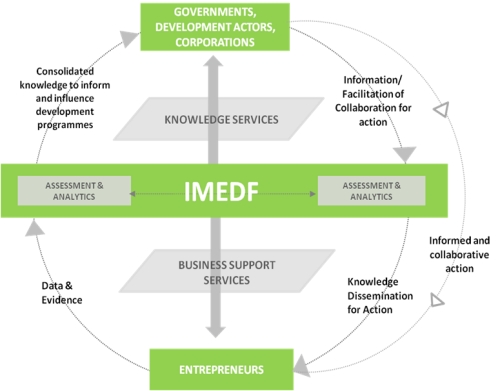Towards Green Enterprises -
Mechanisms to Upscale
MSMEs in India
The present trajectory of economic development in India, characterised by high resource intensity and inequality is likely to create irreversible damage to our social and natural systems - pushing us into poverty and undermining development gains. Running at almost twice its bio-capacity, there is no way that India will be able to achieve sustainable development unless our economic systems result in better and more sustainable outcomes for the economy, society and the environment. Green and inclusive economy models, as an approach, promise positive outcomes for the people and the planet and need to be mainstreamed for achieving sustainable development in India.
One set of institutions that can help achieve
the transformation are green and social micro, small and medium enterprises
(MSMEs). By creating local jobs and capacity building opportunities, MSMEs
serve as effective platforms for income enhancement, local economic
development and sustainable poverty alleviation. Being decentralised in
nature, they allow for the development of resilient economic systems by
preventing locking of large capital and creating improved efficiencies. With
around 36.1 million units throughout the country, MSMEs in India contribute
to 37% percent of the GDP, 37% of India's manufacturing output and employing
close to 20% of the workforce (Fourth Census of Micro, Medium, and Small
Enterprises as published in 2012).
The problem is that enterprise support services are disproportionately available and the high transactions costs involved in accessing services and regulatory requirements tend to negatively affect the innovation capacity of the firms. In a survey conducted by Development Alternatives with 250 aspiring and potential rural entrepreneurs, only 11% interacted with formal institutional systems to set up a business. Over 70% reported that they had not or did not wish to register their businesses owing to cumbersome compliance procedures.
India, in the last five years, has witnessed the development of few inclusive and green business models which have successfully demonstrated the potential for reinforcing the triple bottom line. However, these have remained excluded from mainstream production and consumption systems. There is increasing evidence that factors such as lack of information, access to business services and conducive policy systems have inhibited the scale up of these models in maximising their potential. Citi Foundation (2014) surveyed 40 large companies active in 8 regions across the world and found that 'a complicated regulatory or policy environment' is one of the most frequently cited barriers to adopting inclusive business models. The key barrier to current and aspiring entrepreneurs is the lack of a robust support system.
What is interesting to observe that in a study conducted across Asia on studying entrepreneurship, India ranked in the bottom quartile on external factors such as government support, culture, social capital and access to training. By contrast, intrinsic factors such as entrepreneurial talents and attitudes ranked much higher than external factors in enabling support for aspiring entrepreneurs. Improved external factors may help unlock more of the Indian population's natural entrepreneurial potential.
In the endeavour to boost MSMEs, the Government of India has established the need for mechanisms which allow MSMEs to adopt better and higher levels of technology and remain competitive in a fast globalising world. It asserts to provide sustenance and support to the whole MSME sector (including service sector), with special emphasis on rural and micro enterprises, through suitable measures to strengthen them for converting the challenges into opportunities and scaling new heights (Ministry of MSME, GoI).
We believe that one step in this direction is to create a country level platform that services the needs of green and inclusive enterprises directly and creates a positive ecosystem for them to thrive. In the current development landscape, there is a disconnect between players who undertake assessment and learning of MSMEs from those who service them directly. The platform must be positioned as one that connects with enterprises on the ground and development policy at the national level for effective impact. The platform could be nurtured as a viable business entity for ensuring its sustainability and scalability. The platform aims to:
-
Undertake action for green enterprise development through provision of technical and business support services to entrepreneurs.
-
Disseminate knowledge through evidence based assessment and analysis of enterprises for building a conducive environment for steering the transition to a green economy.
The platform will act as an interface between practice and policy. Action at the micro level will be used as evidence for making policy recommendations. Engagement with development stakeholders will be capitalised for leveraging opportunities and creating multi-stakeholder collaborations for entrepreneurs.
Indian Micro Enterprises Development Foundation
The Development Alternatives Group (DAG) has developed a special purpose vehicle - Indian Micro Enterprises Development Foundation (IMEDF) – to service the development of green and social enterprises. IMEDF capitalises on the knowledge and experience of DAG in development of micro enterprises to service the growth of green and social businesses. Informal and micro enterprises that constitute about 80% of business activities in India and employs around 15% of the total workforce, however are often excluded from mainstream economic development initiatives.
Development Alternatives proposes to build IMEDF as the country level platform for servicing such micro and informal sector enterprises for transition to a green economy. For this, IMEDF connects entrepreneurs with technology providers, technical experts, investors and customers to meet and service the critical needs of technology, capacity, capital investment and customers. Its work is analysed to inform improved action and policy. These components are embedded in the following service packages:
-
Enterprise Support Package: This includes provision and packaging of technology, credit, capacity building and marketing solutions for the enterprises.
-
Market Support Package: This service package primarily addresses the challenges faced by entrepreneurs in reaching out to the consumers.
-
Monitoring Support Package: This service package provides handholding support to the entrepreneurs and monitors the enterprises for a fixed period of time. IMEDF develop tools to monitor the health of the enterprises and recommends corrective action.
-
Knowledge Creation and Dissemination Services: The platform conducts research and analysis and carries out stakeholder engagement to inform policy and practice for enhancing the visibility of green and micro enterprises models.
IMEDF aims to service around 100 entrepreneurs in a day and realise revenues of the magnitude of 10 million Euros by 2022. We believe that this will be achieved not only by the direct services rendered by IMEDF but through partnerships and networks. IMEDF hopes to work closely with public, private and civil society sector partners to develop systematic and collaborative initiatives for sustainable business development at scale. This will build a positive ecosystem for enterprise development in India and bring small business and their needs at the forefront of mainstream banking systems and business services. ■
Chitrangna Dewan
cdewan@devalt.org
Shruti Issar
sissar@devalt.org